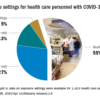News
Infectious disease experts say testing is key to reopening
April 17, 2020
Experts stressed the need for “stepwise approach,” with an emphasis on testing and surveillance.
News
How to sanitize N95 masks for reuse: NIH study
April 17, 2020
Exposing contaminated N95 respirators to vaporized hydrogen peroxide (VHP) or ultraviolet (UV) light appears to eliminate the SARS-CoV-2 virus from the material and preserve the integrity of the masks fit for up to three uses.
![1]()
News
Cautionary tale spurs ‘world’s first’ COVID-19 psychiatric ward
April 17, 2020
It wasn't long before all but two of the unit's 103 patients in South Korea's Daenam Hospital were positive for the virus.
![1]()
News
Protean manifestations of COVID-19: “Our ignorance is profound”
April 17, 2020
“Make sure they didn’t die in vain.”
News
COVID-19 pandemic spells trouble for children’s health
April 16, 2020
School closures could noticeably worsen the epidemic of childhood obesity that already threatens many children in the United States.
Video
‘Silent Hypoxemia’ and Other Curious Clinical Observations in COVID-19
April 16, 2020
Gary S. Ferenchick, MD, MS, a professor of medicine at Michigan State University, interviewed his daughter, Hannah R.B. Ferenchick, MD, an emergency and critical care physician working on the frontline in a busy Detroit hospital, about some of the unusual clinical features of patients with suspected or confirmed COVID-19.
![1]()
Opinion
COVID-19 mythconceptions
April 16, 2020
We are in a position where we need to take in what we can and assess the best data available.
News
COVID-19: Mental illness the ‘inevitable’ next pandemic?
April 16, 2020
“Communities and organizations could consider training nontraditional groups to provide psychological first aid,” the authors wrote.
Opinion
Life in jail, made worse during COVID-19
April 16, 2020
“Psychiatrists and other providers have an opportunity to fix things from the inside out,” Dr. Elizabeth Ford said.
![1]()
News
COVID-19: When health care personnel become patients
April 15, 2020
For physicians and others in the health care industry, almost half of all exposures occurred outside of work.



